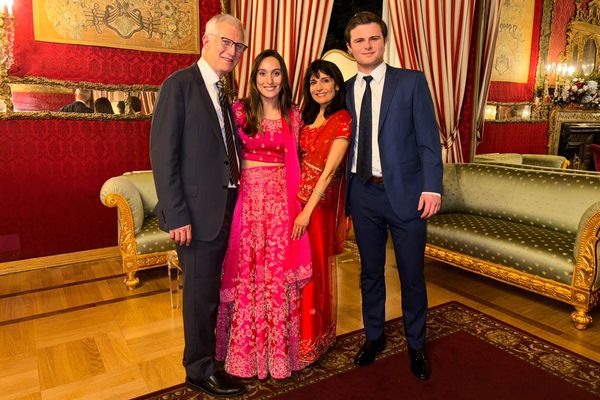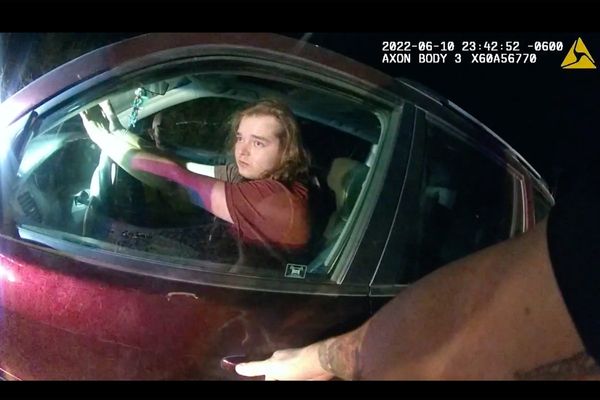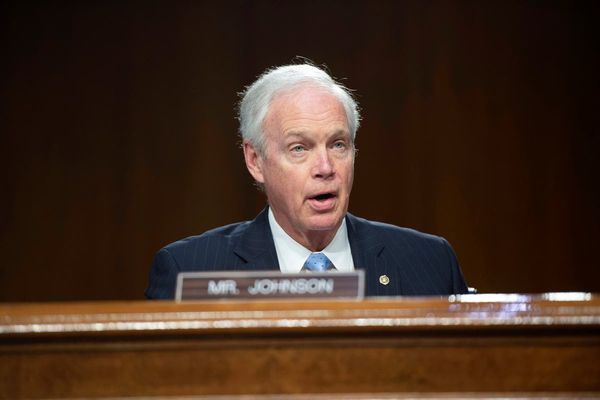WASHINGTON — California’s GOP delegation in the U.S. House of Representatives is generally in lockstep.
None of its 11 members voted on July 21 to guarantee women’s access to contraception. Two joined Democrats Thursday in supporting a massive semiconductor chip production package. And just one voted to impeach former President Donald Trump over the Jan. 6, 2021, insurrection.
On July 19, however, they split 5-6 over codifying federal rights to same-sex and interracial marriage. All 11 have been criticized at one time or another for anti-LGBTQ votes or rhetoric. Lawmakers’ explanations for their votes show a splintering in ideology and message. They also reflect anxiety among some incumbents about tough re-election races.
Take neighboring Central Valley members, House Minority Leader Kevin McCarthy, R-Bakersfield, and Rep. David Valadao, R-Hanford. McCarthy told The Washington Post that the Respect for Marriage Act, which would ensure that same-sex and interracial unions are recognized across state lines, was a ploy by Democrats to distract voters from more immediate issues, like inflation. He voted “no,” he said, because Supreme Court decisions have settled any questions.
Valadao, a moderate who likes to keep a lower national profile, voted “yes.”
“All Americans, regardless of their race, gender or sexual orientation should be treated equally under the law,” he said.
The close colleagues have differed in just 6% of their votes since the start of 2021, according to ProPublica. McCarthy, a Trump ally, went to bat for Valadao after the Hanford congressman voted to impeach the former president for inciting insurrection on Jan. 6. Many analysts credit McCarthy for shielding him from Trump’s wrath during the primary race.
While McCarthy will almost certainly skate to re-election — and become Speaker of the House, if Republicans win a majority, as expected — Valadao’s incumbency is in peril in California’s left-leaning 22nd Congressional District.
Respect for Marriage Act
Forty-seven House Republicans joined a unanimous Democratic caucus in backing the Respect for Marriage Act.
It heads to the Senate, where Democrats are scrambling to get the 60 votes required to consider legislation in the 50-50 chamber. Many Senate Republicans, like McCarthy, say the legislation is superfluous because of two landmark Supreme Court decisions that set federal protections: Obergefell v. Hodges in 2015 (same sex-marriage) Loving v. Virginia in 1967 (interracial marriage).
With justices recently overturning Roe v. Wade, the 1973 decision that set federal abortion rights, lawmakers feared that the Supreme Court could topple other precedents.
In an interview with FOX, Rep. Mike Garcia, R-Santa Clarita, said he did not think the court would overrule Obergefell v. Hodges. But unlike McCarthy, Garcia said that it was his constitutional obligation to vote “yes” because it was settled law.
Like Valadao, Garcia is in a toss-up election, analysts predict. Both are running in newly-drawn districts that President Joe Biden would have won in 2020 — Valadao’s by 13 percentage points, Garcia’s by 12. Both need either Democratic or third-party votes to win.
“What you do in the bedroom, that’s up to you and your partner, and anyone that judges that, that’s certainly not the role of a politician in Washington D.C.,” Garcia told Inside California Politics co-host Frank Buckley. “Regardless of my feelings, it’s a constitutional requirement now to make sure that folks have those equal rights.”
Garcia added that protections for people in interracial marriages was “clearly something I wasn’t comfortable even thinking about voting against.”
Republicans in tough elections
Valadao faces Assemblyman Rudy Salas, D-Bakersfield, in the San Joaquin Valley’s new 22nd Congressional District, which runs from Hanford past Wasco. Garcia faces a rematch with former Assemblywoman Christy Smith in Southern California’s new 27th, which takes in Santa Clarita through Palmdale and Lancaster.
Other House Republicans who face uncertain elections in November are Southern California Reps. Young Kim, Ken Calvert and Michelle Steel. Analysts say that Kim and Calvert’s districts will likely pick a Republican; Steel’s leans in favor of a Republican.
Calvert has been criticized for anti-LGBTQ messaging. In the early 1990s, he sent pink mailers asking whether a challenger would represent Riverside “or San Francisco.” The opponent, now-Rep. Mark Takano, had not publicly disclosed he was gay; a Calvert ally outed him.
Calvert has a Palm Springs LBGTQ enclave in his new 41st district, where he is running against a gay Democrat. He voted “yes” on Respect for Marriage. The Corona Republican told his local paper, The Press-Enterprise, earlier this year that “we need to ensure all people are treated equally under the law.”
Kim, R-Fullerton, and Steel, R-Seal Beach, told their hometown paper, The Orange County Register, this spring that they oppose same-sex marriage and that the Supreme Court had settled protections. They voted “no.”
Republican ideology on same-sex marriage
California House Republicans in safe contests also split on last week’s House bill. Two who are in districts that reach into Southern California voted in support of federal same-sex and interracial marriage protections.
“As an ardent advocate for limited government, I do not feel that government should be empowered to dictate the terms of a marriage,” said Rep. Jay Obernolte, R-Hesperia, who is running in the new 23rd Congressional District.
“I am also a passionate believer in religious freedom, and therefore I support and will continue to defend the right of churches, synagogues, mosques and other religious establishments to decide for whom and under what circumstances they perform marriages,” Obernolte said.
Three, including McCarthy, running in the Central Valley and Northern California, voted “no.” Central Valley Rep. Connie Conway, who is fulfilling former Congressman Devin Nunes’ unexpired term and is not seeking re-election, also voted against the bill.
While most House GOP members voted “no,” a Gallup poll showed for the first time last year that a majority of a Republicans supported same-sex marriage.
Seventy-one percent of Americans support recognizing gay marriage, according to a 2022 Gallup poll. Weekly churchgoers offering the least support. Many in the GOP aim to court conservative religious, primarily Christian, supporters — often at the expense of LGBTQ people.
“I believe marriage is an institution that exists in nature and is specific to the creation and protection of new life,” Rep. Tom McClintock, R-Elk Grove, said of voting “no.” McClintock is running in the new 5th Congressional District.
McClintock added that there is not a state that bans interracial marriage “and no one in their right mind would support such bans.”
Californians’ opinion on same-sex marriage have shifted drastically over the last two decades. The first legal same-sex marriage ceremony in the U.S. occurred in San Francisco in 2004, when California Gov. Gavin Newsom was mayor. California’s Supreme Court overturned the state’s ban on same-sex marriages in 2008. A few months later, voters approved a ballot initiative to bar it again. Courts overturned that constitutional amendment, allowing same-sex marriages to resume in California before the Supreme Court decided Obergefell v. Hodges.
Still, the 2008 measure remains in the state’s constitution until another voter-approved amendment erases it. Though California is a left-leaning state, advocates have warned the need for a ballot initiative to eradicate the vestige should the Supreme Court overturn Obergefell v. Hodges
California Republican votes on the Respect for Marriage Act
Ken Calvert: Yes. He is running in the 41st. The race will likely go to the Republican.
Mike Garcia: Yes. He is running in the 27th. The race is a toss-up.
Darrell Issa: Yes. He is running in the 48th. The race is safe for the Republican.
Jay Obernolte: Yes. He is running in the 23rd. The race is safe for the Republican.
David Valadao: Yes. He is running in the 22nd. The race is a toss-up.
Connie Conway: No. She is not seeking re-election.
Young Kim: No. She is running in the 40th. The race will likely go to the Republican.
Doug LaMalfa: No. He is running in the 1st. The race is safe for the Republican. Kevin
McCarthy: No. He is running in the 20th. The race is safe for the Republican. Tom
McClintock: No. He is running in the 5th. The race is safe for the Republican. Michelle Steel: No. She is running in the 45th. The race leans toward the Republican.
--------
(McClatchy DC’s Court Cox contributed to this story.)
---------










